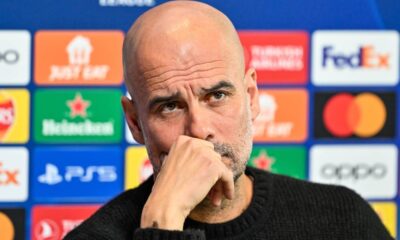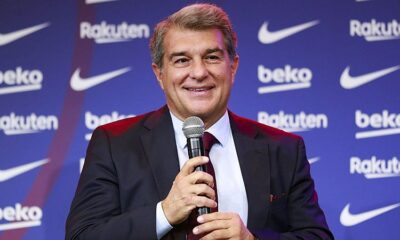Football
Xavi is not Guardiola. The comparison doesn’t make sense. Barcelona must not end up like Arsenal
They spent more than one game on the field as teammates. As well as in the role of the coach and his charges. Pep Guardiola has done an amazing job on the Barcelona bench. But to compare his situation after joining the team with Xavi’s doesn’t make sense. Honestly? Xavi has it a lot harder.

They spent more than one game on the field as teammates. As well as in the role of the coach and his charges. Pep Guardiola has done an amazing job on the Barcelona bench. But to compare his situation after joining the team with Xavi’s doesn’t make sense. Honestly? Xavi has it a lot harder.
One of Pep Guardiola’s first moves as Barcelona coach was to try and sign Emmanuel Adebayor from Arsenal. A season later, he preferred to bring in Zlatan Ibrahimovic from Inter Milan for nearly €70 million, only to send him to rival AC Milan a year later.
The first summer Barcelona signed the following players with Pep Guardiola as coach:
The total cost of these players was almost €100 million. We don’t count Gerard Pique among this ciftu because of his position and Barcelona DNA. Here we need to be clear on a fundamental fact. It was mentioned at the outset that Guardiola has done an amazing job, but to compare the circumstances of his team to Xavi’s situation is absolutely insane.
Xavi can now rely at most on the youngsters led by Pedro, Gavi, Araujo, Kounde or the experienced Lewandowski. Guardiola had at his disposal Carles Puyol, who was already a nine-year veteran and captain of the team. The next in line was Xavi with nine years of experience.
Andrés Iniesta broke through under Louis van Gaal in 2002. Moreover, his best was yet to come. The icing on the cake was the presence of Lionel Messi. Not only was the Argentine starlet clearly on his way to becoming the best player in the world, but back in 2004 Ronaldinho had already said he was better than him.
Guardiola made two big decisions in his first season based on La Masia. He brought back Gerard Piqué and gave a chance to Sergio Busquets. This wasn’t some decision ala “I’m betting it all on the youngsters” that should have filled the headlines. Let’s face it, he mostly used top talents that were already well established and nurtured a few others alongside them.
Piqué was a young and raw talent. Guardiola had the luxury of having Puyol playing alongside him as mentor, bodyguard and great friend. Busquets was equally young and again a diamond in the rough, but Pep had the luxury of letting him play with two of the best midfielders in the world in the same line-up.
Now, if Xavi were to embark on a crazy fantasy, playing all his cards on young offspring, it would mean he would be hoarding inexperienced young talent in the team at the expense of other inexperienced young talent. We can see clear patterns in football for this option, where the roster is too crowded with young inexperienced players. In almost overwhelming cases, most will burn out.
A logical outcome because without experience they can’t cope with the incredible pressure and don’t have the much needed oversight that the aforementioned Piqué and Busquets could afford. A number of journalists and pundits were already writing off Robert Lewandowski’s commitment to Barcelona before his arrival and condemning the entire management for throwing La Masia overboard.
However, it must be remembered that this is a world-class striker, where Guardiola was equally betting on him at his then Bayern Munich. Some journalists really have no sympathy for Barcelona, Guardiola, Xavi or anything to do with the club or his team.
The Catalan big club cannot indulge in crazy fantasies and gambling with youth.
The risk? Collapse. The big clubs remain truly huge and in the limelight only as long as they remain competitive. Betting on barely seasoned youngsters or offspring is Russian roulette all over again. All it takes is for a few to burn out or get injured.
Take Fati’s knee problems again as an example. Now we see that he is getting back into shape, but if it doesn’t work out, everything will collapse. And then an endless merry-go-round ensues. The absence of trophies results in smaller financial rewards, fewer and less lucrative sponsorship deals, lower stadium attendances and worse TV rights revenues.
You’re poorer for it, so you can’t afford to sign ready-made and star players when you need to. Your prestige takes a critical hit so you can no longer attract high caliber players. This in turn hits revenue, so sponsors are even less interested in your brand and association with the club. Less revenue means more debt, which continues.
That’s a blueprint for financial disaster. While Laporta and Barcelona’s management take calculated risks, some journalists and fans are whipping themselves into a frenzy over the mere concept of betting on experience at the expense of unproven talent. Although that much talked about talent is already represented on the pitch.
It is tempting to recall the plan of club president Laporta: ” Right now we have huge debts, but we are able to meet payment obligations, we have a huge name and serious players who are interested in joining us. We have to strike now while we still can. In a year or two that chance will probably be gone.”
A completely rational approach. So if anyone is condemning the decision, it may seem laughable to others. We can point to one English club that has embarked on this spiral and only this season can finally break out of it. We are, of course, talking about Arsenal, who have followed these ideals and for fourteen years have not had results to match the greatness of this club.
Arsenal had a debt for a new stadium but were very conscientious to pay it off as soon as possible. Simply put, they were betting on youth to an increasing extent. Their older stars began to disappear or leave. Suddenly they were left with talented but inexperienced young players. The only thing they really had. And the results showed it. The relegation was almost to the bottom, the prestige dropped tremendously.
They went from the limelight of one of Europe’s best clubs to struggling to qualify for European competitions at all. Arsenal fell hard and at the worst possible time. A club that had nowhere near the problems that Barcelona have now. It’s really easy to fall to the very bottom in football. It’s even harder to get back to the limelight and be a respected club again.
Source: David Kvapil, Transfermarkt










